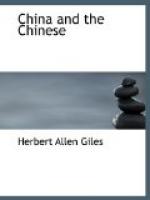“Take no heed,” he adds, “of time, nor of right and wrong; but passing into the realm of the Infinite, find your final rest therein.”
An abstract Infinite, however, soon ceased to satisfy the natural cravings of the great body of Taoist followers. Chuang Tzu had already placed the source of human life beyond the limits of our visible universe; and in order to secure a return thither, it was only necessary to refine away the grossness of our material selves according to the doctrine of the Way. It thus came about that the One, in whose obliterating unity all seemingly opposed conditions were to be indistinguishably blended, began to be regarded as a fixed point of dazzling intellectual luminosity, in remote ether, around which circled for ever and ever, in the supremest glory of motion, the souls of those who had successfully passed through the ordeal of life, and who had left the slough of humanity behind them.
Let me quote some lines from a great Taoist poet, Ssu-k’ung T’u, written to support this view. His poem consists of twenty-four stanzas, each twelve lines in length, and each dealing with some well-known phase of Taoist doctrine.
“Expenditure of force leads to outward
decay,
Spiritual existence means inward
fulness.
Let us revert to Nothing and enter
the Absolute,
Hoarding up strength for Energy.
Freighted with eternal principles,
Athwart the mighty void,
Where cloud-masses darken,
And the wind blows ceaseless around,
Beyond the range of conceptions,
Let us gain the Centre,
And there hold fast without violence,
Fed from an inexhaustible supply.”
In this, the first, stanza we are warned against taxing, or even using, our physical powers, instead of aiming, as we should, at a purely spiritual existence, by virtue of which we shall ultimately be wafted away to the distant Centre in the Infinite.
“Lo, the Immortal, borne by spirituality,
His hand grasping a lotus-flower,
Away to Time everlasting,
Trackless through the regions of
Space!”
These four lines from stanza v give us a glimpse of the liberated mortal on his upward journey. The lotus-flower, which the poet has placed in his hand, is one of those loans from Buddhism to which I shall recur by and by.
“As iron from the mines,
As silver from lead,
So purify thy heart,
Loving the limpid and clean.
Like a clear pool in spring,
With its wondrous mirrored shapes,
So make for the spotless and true,
And riding the moonbeam revert to
the Spiritual.”
These eight lines from stanza vii, which might be entitled “Smelting,” show us the refining process by which spirituality is to be attained.
Seclusion and abandonment of the artificial are also extolled in stanza xv:—




